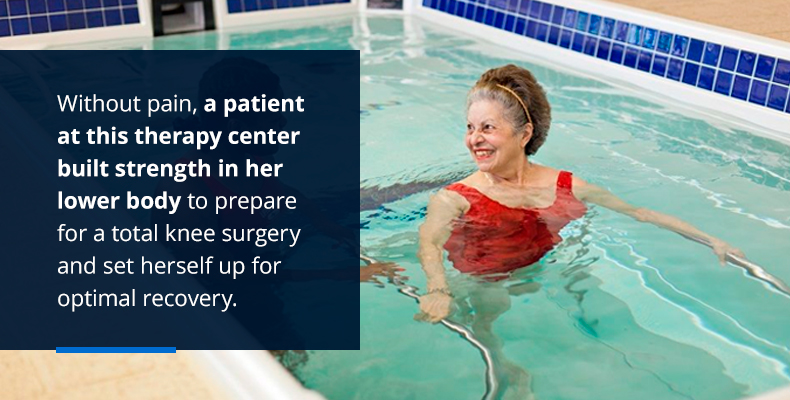Hydrotherapy Rehabilitation Success Stories
In recognition of National Rehabilitation Week, we’re highlighting a few inspiring hydrotherapy rehabilitation stories from our customers.
Hydrotherapy for Cerebral Palsy and Scoliosis
When Aaron first came to hydrotherapy for his cerebral palsy and scoliosis, he wasn’t able to perform exercises by himself. Throughout his journey, he gained the ability to engage his hips and core, stand up straight, and walk five times faster against resistance jets.
Hydrotherapy for Accident Rehabilitation
After a devastating helicopter collision, an Army Staff Sergeant recovered muscle strength after having surgery to remove shrapnel.
“I couldn’t wait to get in the pool,” said Army Staff Sergeant Casey Church, “I haven’t been able to do anything out there on land so everything’s been in the pool. So if it wasn’t for doing anything in the pool, I wouldn’t be doing a whole lot.”
Hydrotherapy for Children’s Orthopedic Centers
This children’s orthopedic center uses underwater treadmills and plunge pools to help kids recover from injury faster so they can get back to their childhood.
Hydrotherapy to Support Surgical Interventions

Without pain, a patient at this therapy center built strength in her lower body to prepare for a total knee surgery and set herself up for optimal recovery.
Another patient at the facility benefited from hydrotherapy post-surgery. When the patient feared putting weight on the leg following a procedure, hydrotherapy assisted in building his confidence and muscle strength.
Aquatic Therapy Benefits in Rehabilitation
These rehabilitation success stories illustrate the benefits of hydrotherapy. Additional advantages of using aquatic therapy include physiological and psychological benefits along with client satisfaction.
Physiological Benefits
The physiological advantages of hydrotherapy are well-known among clinicians. Key benefits include:
- Reducing patient pain during treatment.
- The opportunity to commence rehabilitation sooner.
- More available options for physical therapy.
Psychological Benefits
There are numerous psychological benefits of aquatic therapy in rehabilitation, including stress relief from muscle relaxation and exercises associated with fun in the water.
Aquatic therapy helps increase patients’ body awareness, allowing them to think of their movements while being challenged by the water’s viscosity. While patients focus on body movements, aqua therapy assists with the development of concentration skills and alertness. This level of awareness is incredibly beneficial to patient or athlete recovery.
When patients can move freely in the water, it builds their confidence that they are progressing and makes them feel better during rehabilitation. Progress in the water helps cultivate a positive outlook and gives the patient the hope that mobility will increase on land.
Client Satisfaction
Clinicians find hydrotherapy in rehabilitation has high client satisfaction because of the treatment’s tangible physical and psychological benefits. Greater client satisfaction translates to better adherence to aqua therapy regimes, higher retention rates and more success stories.
Schedule a Consultation to Improve Patients’ Rehabilitation Success
Learn how you can incorporate aquatic therapy into your facility and improve your patients’ rehabilitation success.

